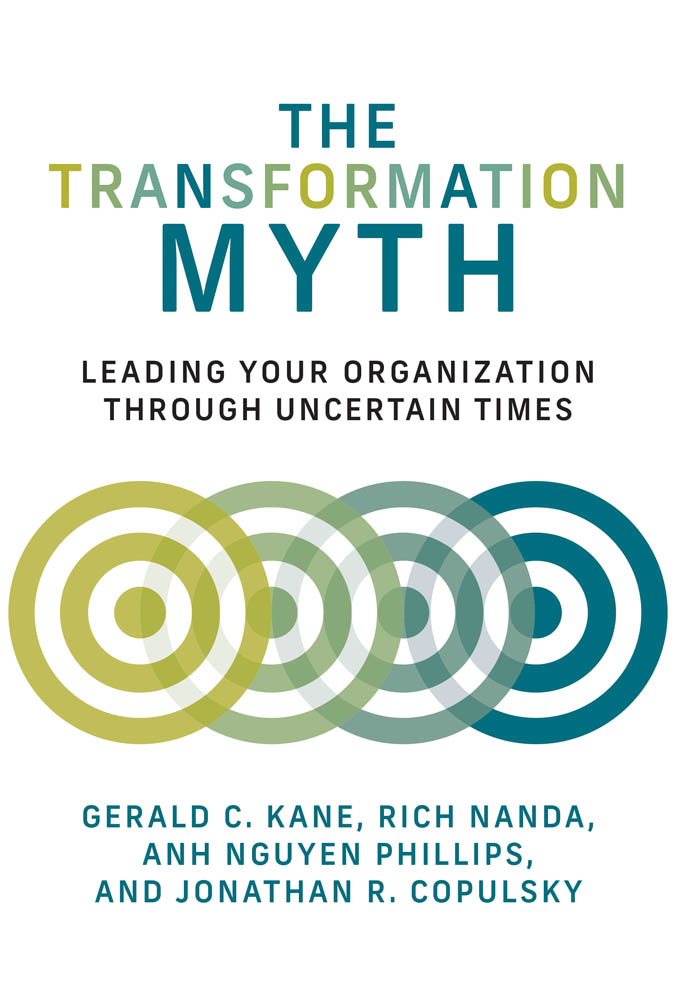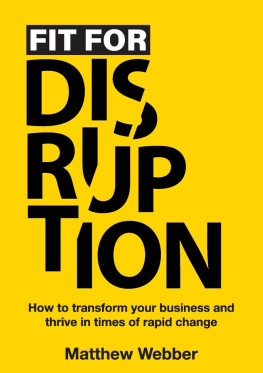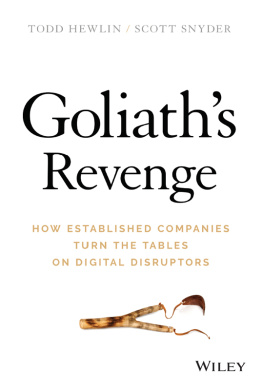Contents
Guide
Pagebreaks of the print version

Management on the Cutting Edge series
Paul Michelman, series editor
Published in cooperation with MIT Sloan Management Review
The AI Advantage: How to Put the Artificial Intelligence Revolution to Work
Thomas H. Davenport
The Technology Fallacy: How People Are the Real Key to Digital Transformation
Gerald C. Kane, Anh Nguyen Phillips, Jonathan Copulsky, and Garth Andrus
Designed for Digital: How to Architect Your Business for Sustained Success
Jeanne W. Ross, Cynthia Beath, and Martin Mocker
See Sooner, Act Faster: How Vigilant Leaders Thrive in an Era of Digital Turbulence
George S. Day and Paul J. H. Schoemaker
Leading in the Digital World: From Productivity and Process to Creativity and Collaboration
Amit S. Mukherjee
The Ends Game: How Smart Companies Stop Selling Products and Start Delivering Value
Marco Bertini and Oded Koenigsberg
Open Strategy: Mastering Disruption from Outside the C-Suite
Christian Stadler, Julia Hautz, Kurt Matzler, and Stephan Friedrich von den Eichen
The Transformation Myth: Leading Your Organization through Uncertain Times
Gerald C. Kane, Rich Nanda, Anh Nguyen Phillips, and Jonathan R. Copulsky

The Transformation Myth
Leading Your Organization through Uncertain Times
Gerald C. Kane, Rich Nanda, Anh Nguyen Phillips, and Jonathan R. Copulsky
The MIT Press
Cambridge, Massachusetts
London, England
2021 Massachusetts Institute of Technology
All rights reserved. No part of this book may be reproduced in any form by any electronic or mechanical means (including photocopying, recording, or information storage and retrieval) without permission in writing from the publisher.
The MIT Press would like to thank the anonymous peer reviewers who provided comments on drafts of this book. The generous work of academic experts is essential for establishing the authority and quality of our publications. We acknowledge with gratitude the contributions of these otherwise uncredited readers.
Library of Congress Cataloging-in-Publication Data
Names: Kane, Gerald C., author. | Nanda, Rich, author. | Phillips, Anh Nguyen, author. | Copulsky, Jonathan R., author.
Title: The transformation myth: leading your organization through uncertain times / Gerald C. Kane, Rich Nanda, Anh Nguyen Phillips, and Jonathan R. Copulsky.
Description: Cambridge, Massachusetts: The MIT Press, [2021] | Series: Management on the cutting edge | Includes bibliographical references and index.
Identifiers: LCCN 2020052176 | ISBN 9780262046060 (hardcover)
Subjects: LCSH: Crisis management. | Organizational change. | Information technologyManagement.
Classification: LCC HD49.K36 2021 | DDC 658.4/056dc23
LC record available at https://lccn.loc.gov/2020052176
d_r0
Contents
List of Figures
- Technology trends for use in scenario planning
- Growth mindset and digital disruption
- Components of capabilities
- Questions to ask about where to play and how to win
- Partnerships and digital maturity
- The talent market covers a spectrum of worker types and work arrangements.
- Adapting the workplace to a shifting environment.
- Hallmarks of empowered cross-functional teams
List of Tables
- Features of acute versus chronic disruption
- Sample capabilities across various functions
- The capabilities matrix
- Mobility ecosystem map
- Cloud capability map
- Going beyond the classroom for continual learning (examples)
- Applicable tactics for strengthening customer relationships
List of Questions
- : Trends
- : Uncertainties and likely outcomes (sample)
- : Possible scenarios (sample)
- : No-regrets actions in different stages of disruption
Series Foreword
The world does not lack for management ideas. Thousands of researchers, practitioners, and other experts produce tens of thousands of articles, books, papers, posts, and podcasts each year. But only a scant few promise to truly move the needle on practice, and fewer still dare to reach into the future of what management will become. It is this rare breed of ideameaningful to practice, grounded in evidence, and built for the futurethat we seek to present in this series.
Paul Michelman
Editor in Chief
MIT Sloan Management Review
Introduction: COVID as a Case Study in Leadership
On January 8, 2020, Chinese researchers reported that they had identified a new virus that had infected dozens of people across Asia. Over the following months, this novel coronaviruslater named SARS-CoV-2 that leads to an illness known as COVID-19swept the world and disrupted the global economic, medical, transportation, and political infrastructure. Countries, states, and regions across the world issued a patchwork of stay-at-home orders, face covering requirements, travel restrictions, closures of nonessential businesses, and limitations on in-person gatherings. For many organizations, it triggered decisions to require employees to work remotely or students to attend virtual classes.
In the weeks and months that followed, organizations undertook significant efforts to respond to threats of infection to employees and customers, supply chain interruptions, demand inflections, and extraordinarily high levels of uncertainty. Although as of this writing the grim statistics from the COVID pandemic lag those of the great flu pandemic of 1918, which infected more than a third of the worlds population at the time, the numbers are staggering in and of themselves and are symptomatic of a crisis that few anticipated in the months prior to its onset.
Yet, in researching and writing this book, we realized that the COVID pandemic is just one of many major disruptions that organizations have faced over the past thirty years or so, including, but not limited to, the fall of the Soviet Union in 1991 and the end of the Cold War, the Y2K crisis at the end of the last millennium, the dot-com boom and bust shortly after the turn of the century, the September 11, 2001, terror attacks in the United States, the 2004 Indian Ocean Tsunami, the 2008 housing and financial crisis, the 2010 Icelandic Volcano disruption, and the 2016 Brexit vote.
Furthermore, the response to disruption may magnify or reduce its effects. For example, although the stock market crash of 1929 is often seen as the disruption that led to the Great Depression, it was most certainly exacerbated by other decisions and events that occurred in the subsequent years. Significant policy or regulatory shifts, such as the 2002 Sarbanes-Oxley Act or the 2018 European Union General Data Protection Regulation (GDPR), may also be considered a type of disruption that forces companies to adapt quickly.
In fact, in the United States, we witnessed a compounding effect while working on this book when the death of George Floyd on May 25, 2020, in connection with his arrest by Minneapolis police officers triggered worldwide protests and launched a new awareness about race relations within societies and organizations. What marks these kinds of disruptions is that they are sudden and dramatic, as opposed to longer-term shifts like climate change or the ever-increasing digitization of all aspects of business.








